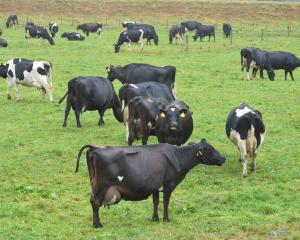Bank of New Zealand senior economist Craig Ebert said Statistics New Zealand terms of trade, a measure of how much imports can be funded with a fixed amount of exports, were very positive.
''Normally, these things are just a matter of splitting the nominal export and import values we largely know about into their respective price and volume components then seasonally adjusting the latter in order to better gauge the real trends. Usually, a swings and roundabouts show, in other words.
''But today's overseas trade index seemed to have bonuses all round. It was verging on magical.''
Market expectations came within a 1.5% gain to the BNZ's top-of-the-range call at 4.5%, he said.
BNZ economists had sweated on the number for a second quarter in a row after it failed to fire in December.
However, it seemed only a matter of time before the big spike seen in traded dairy prices would show up in the Statistics NZ measure, Mr Ebert said.
On present information, the BNZ assumed the terms of trade index would rise a further 7% in June, returning it close to the 38-year highs it got to during 2011.
The surge would be primarily because of dairy prices and there could be a come-down in the third-quarter figures. But as dairy exports comprised around a quarter of New Zealand's merchandise exports, they would tend to dominate the results - just like the associated recent boost to the dairy payout would be significant to the economy, he said.
ASB economist Christina Leung said that from her perspective, the higher than expected result reflected both higher than expected export prices and lower than expected import prices.
Higher dairy prices were a key driver, reflecting the increase in global dairy prices as supply concerns intensified in the wake of increasingly dry weather conditions.
The effects of the drought were also reflected in an increase in meat export volumes.
Export prices increased 1.9% in the quarter, led by a 6.8% increase in dairy prices. Partly offsetting that was the decline in meat prices, down 3.1% in the quarter as New Zealand farmers brought forward livestock slaughter in the face of increasingly dry weather.
Import prices fell 2.1%, reflecting the continued strength of the dollar.
''The terms of trade represent New Zealand's purchasing power with the rest of the world so today's stronger-than-expected result bodes well for national income growth.''
New Zealand's elevated terms of trade was one factor underpinning the high dollar, Ms Leung said. She expected further increases in export prices given the surge in global dairy prices in March and April, supported by demand from China.


